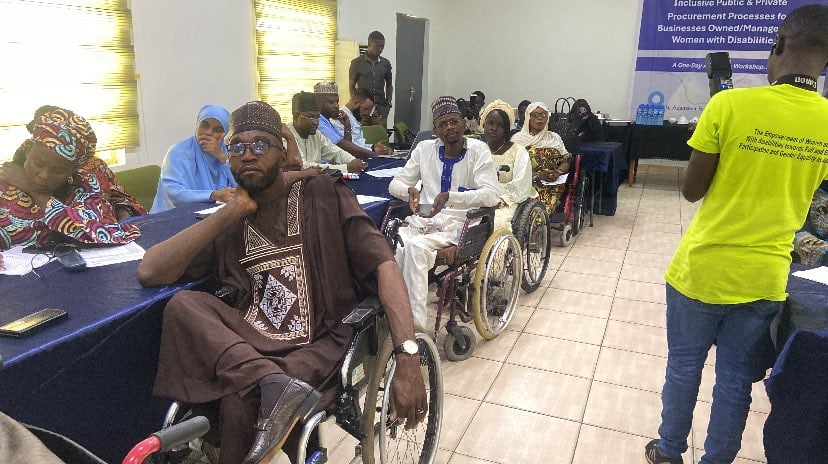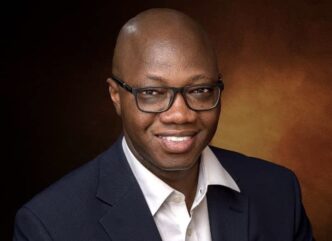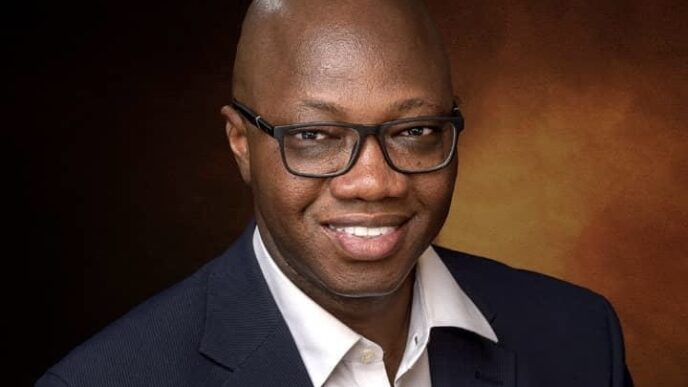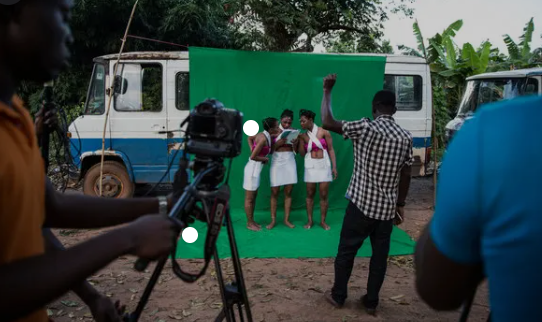A cross-section of PWDs | File photo
BY SAMUEL JEKILI
In every workplace, policies and practices are often written with the promise of fairness and inclusion. Yet, for many persons with disabilities in Nigeria, the reality is far from inclusive. Discrimination is not always loud or verbal; it can be silent, structural, and systemic. One of the most glaring forms is in the very buildings they are expected to work in, the same buildings that, by design or neglect, tell them they do not belong.
Picture a qualified applicant in a wheelchair arriving for an interview, only to be met with a flight of stairs and no ramp in sight. The message is not only clear but deeply wounding — this is not a place for you. Imagine a visually impaired employee trying to navigate a poorly lit office with no tactile indicators or assistive signage. Or a hearing-impaired staff member forced to rely solely on lip-reading during crucial meetings because no interpretation services are provided. These scenarios are not fiction; they happen daily across offices, government buildings, and private organisations in Nigeria.
Such barriers are not mere inconveniences. They strip persons with disabilities of their dignity, erode their confidence, and deny them equal opportunity. The Nigerian Discrimination Against Persons with Disabilities (Prohibition) Act of 2019 clearly outlaws these forms of exclusion, requiring public buildings to be accessible. Yet, enforcement remains weak and, in many cases, non-existent. Too many organisations continue to hide behind the excuse of “budget constraints” while pouring resources into aesthetic renovations that do nothing to improve accessibility.
Advertisement
As a human resources professional, inclusion is more than a checkbox on a compliance form. It is about creating an environment where every employee can thrive, contribute, and feel valued. That starts with the physical space. If a workplace is not accessible, it is already discriminatory before a single word is spoken. Accessibility ramps, elevators, wider doorways, ergonomic desks, and assistive technologies are not luxuries; they are fundamental requirements for equality.
But the issue does not stop at building structures. Discrimination against persons with disabilities in the workplace can also take subtle, yet equally harmful, forms. It is the manager who assumes a person with a disability cannot handle complex tasks. It is the colleague who bypasses them in conversations. It is the performance appraisal system that fails to account for the different ways people may need to achieve the same result. It is the recruitment policy that filters out applicants because they cannot complete a physically demanding test irrelevant to the role.
Even when persons with disabilities are employed, they are often left out of training and career development programs, which diminishes their chances for promotion. This is not just unfair; it is a waste of human potential. People with disabilities bring resilience, problem-solving skills, and creativity to the workplace qualities that any forward-thinking organisation should value.
Advertisement
Employers must also understand that inclusion requires ongoing commitment. It is not enough to install a ramp or provide a sign language interpreter once. Accessibility must be maintained and improved over time. Employee feedback should be actively sought from persons with disabilities to identify and fix barriers before they become bigger problems.
Cultural attitudes also play a role in workplace discrimination. In many Nigerian settings, disability is still viewed through the lens of pity or charity rather than rights and equality. This mindset seeps into workplace culture, where persons with disabilities are either overprotected to the point of exclusion or ignored altogether. As HR professionals, we must actively challenge such biases through awareness training and inclusion policies that hold everyone accountable.
We must also recognise that discrimination is not only a moral issue but a business one. An inaccessible workplace narrows the talent pool and limits diversity of thought. Inclusive organisations, on the other hand, benefit from richer perspectives, stronger team collaboration, and improved brand reputation. In today’s competitive market, companies cannot afford to ignore a segment of the population that is skilled, capable, and ready to contribute.
Nigeria has laws to protect persons with disabilities, but laws alone are not enough. Enforcement bodies must do their part, but so must organisations. We must treat accessibility as a non-negotiable standard, just like workplace safety or salary payment. The question should never be “Can we afford to make our workplace accessible?” but rather “Can we afford not to?”
Advertisement
The time for half-hearted inclusion is over. Every HR department, business leader, and policymaker must take a hard look at their workplace and ask if someone with a disability walked in today, would they be able to work here with dignity, safety, and equal opportunity? If the answer is no, then change is urgently needed.
The fight for equality is not just about removing physical barriers. It is about breaking the invisible chains of prejudice, ignorance, and neglect. Persons with disabilities have fought long enough to be seen as equal partners in the workforce. It is time for organisations in Nigeria to step up, not out of charity, but out of justice. Because until every workplace is truly accessible, the promise of equality remains just words on paper.
Samuel Jekeli, a human resources professional, writes from Abuja.
Advertisement
Views expressed by contributors are strictly personal and not of TheCable.








